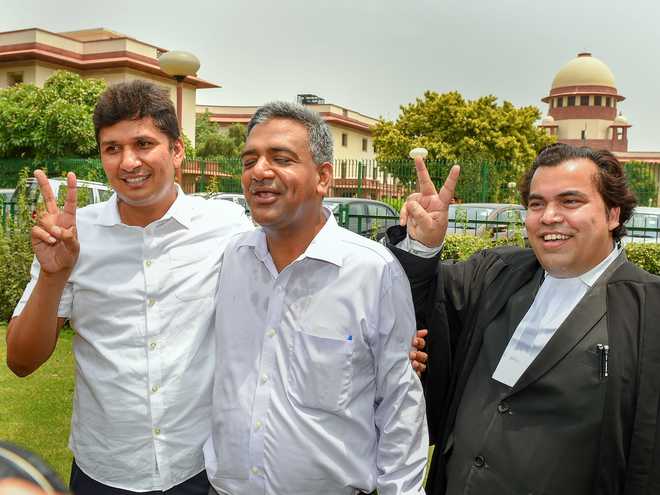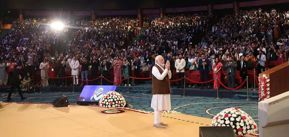
AAP chief spokesperson Saurabh Bharadwaj and party member Nagendra Sharma show victory sign as they celebrate the verdict of Supreme Court in New Delhi on Wednesday, July 4, 2018. PTI
New Delhi, July 4
The Supreme Court on Wednesday delivered a landmark verdict on the tussle for power between Lt Governor and elected government of Delhi. The Tribune Legal Editor Satya Prakash explains the verdict.
What's at the root of tussle for power in Delhi?
The tussle for power between AAP government and LG as the Centre's representative is because of Delhi's unique position as a Union Territory with an elected government which doesn't enjoy much power over important agencies. The elected government does not have control over issues relating to public order, police and land.
The fact that the Centre and Delhi were ruled by different parties only complicated the issues as the AAP government was demanding control over various agencies while the LG - an appointee of the Centre - was not ready to concede much and often allegedly sat over files.
What did SC say?
The Supreme Court ruled that Delhi Lt Governor does not have independent decision-making powers. A five-judge Constitution Bench led by Chief Justice of India Dipak Misra said the LG is generally bound to act on the aid and advice of the Council of Ministers, except on three subjects reserved for him or where he differs with the decision of the elected NCT government and decides to refer an issue to the President. All decisions of the NCT Council of Ministers have to be communicated to the LG. However, such communication does not mean LG's concurrence is required, it said.
Does it change the legal position?
No, it doesn't change the legal position. Articles 239, 239A and 239AA of the Constitution, the National Capital Territory of Delhi Act, 1991 and the Transaction of Business of the Government of National Capital Territory of Delhi Rules, 1993 that govern the relationship of the LG and the elected government of Delhi remain the same. The LG can still stall the elected government's decisions in appropriate cases citing difference of opinion and send the matter to the President. In such cases, he would be bound by the President's (read the Centre's) directions; and not the decision of the NCT Government.
Then what did Constitution Bench court do?
The Constitution Bench has only clarified the legal position and outlined the broader contours and parameters of the relationship between the LG and the elected government of NCT Delhi as envisaged under the constitutional provisions, NCT Act, 1991 and the Transaction of Business Rules, 1993. It partially set aside the August 2016 verdict of the Delhi High Court which had declared that LG was the administrative head of Delhi.
What's the message for LG in the verdict?
The Supreme Court asks the LG not to behave like and obstructionist. Also, the court makes it clear that he can't use his powers under the proviso to Article 239AA as a matter of routine and every trivial difference does not fall under the proviso. He can't act mechanically and has to apply his mind before referring a matter to the President.
What's the message for CM/elected government in the verdict?
The Constitution Bench said the Council of Ministers being headed by the Chief Minister should be guided by values and prudence accepting the constitutional position that the NCT of Delhi is not a state. "Our Constitution is a constructive one. There is no room for absolutism. There is no space for anarchy. Sometimes it is argued, though in a different context, that one can be a "rational anarchist", but the said term has no entry in the field of constitutional governance and rule of law," the top court said.
What will happen to pending contentious issues between LG and the elected government?
The Constitution Bench unanimously said all such issues raised in various petitions, including Ministry of Home Affairs notification of 2015 with regard to union territories and service matters, will be separately decided by division bench concerned on the basis of the constitutional parameters laid down by the Constitution Bench.
Can AAP Government claim victory?
Yes, it can as the verdict circumscribes the LG's powers in many ways without curtailing those powers.



























